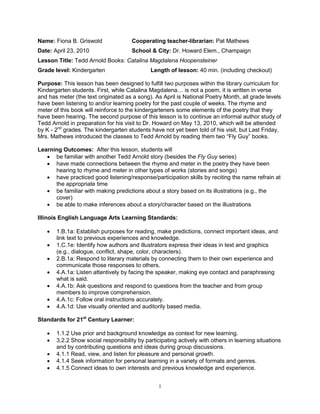
Kindergarten Read-Aloud Lesson
- 1. Name: Fiona B. Griswold Cooperating teacher-librarian: Pat Mathews Date: April 23, 2010 School & City: Dr. Howard Elem., Champaign Lesson Title: Tedd Arnold Books: Catalina Magdalena Hoopensteiner Grade level: Kindergarten Length of lesson: 40 min. (including checkout) Purpose: This lesson has been designed to fulfill two purposes within the library curriculum for Kindergarten students. First, while Catalina Magdalena… is not a poem, it is written in verse and has meter (the text originated as a song). As April is National Poetry Month, all grade levels have been listening to and/or learning poetry for the past couple of weeks. The rhyme and meter of this book will reinforce to the kindergarteners some elements of the poetry that they have been hearing. The second purpose of this lesson is to continue an informal author study of Tedd Arnold in preparation for his visit to Dr. Howard on May 13, 2010, which will be attended by K - 2nd grades. The kindergarten students have not yet been told of his visit, but Last Friday, Mrs. Mathews introduced the classes to Tedd Arnold by reading them two “Fly Guy” books. Learning Outcomes: After this lesson, students will be familiar with another Tedd Arnold story (besides the Fly Guy series) have made connections between the rhyme and meter in the poetry they have been hearing to rhyme and meter in other types of works (stories and songs) have practiced good listening/response/participation skills by reciting the name refrain at the appropriate time be familiar with making predictions about a story based on its illustrations (e.g., the cover) be able to make inferences about a story/character based on the illustrations Illinois English Language Arts Learning Standards: 1.B.1a: Establish purposes for reading, make predictions, connect important ideas, and link text to previous experiences and knowledge. 1.C.1e: Identify how authors and illustrators express their ideas in text and graphics (e.g., dialogue, conflict, shape, color, characters). 2.B.1a: Respond to literary materials by connecting them to their own experience and communicate those responses to others. 4.A.1a: Listen attentively by facing the speaker, making eye contact and paraphrasing what is said. 4.A.1b: Ask questions and respond to questions from the teacher and from group members to improve comprehension. 4.A.1c: Follow oral instructions accurately. 4.A.1d: Use visually oriented and auditorily based media. Standards for 21st Century Learner: 1.1.2 Use prior and background knowledge as context for new learning. 3.2.2 Show social responsibility by participating actively with others in learning situations and by contributing questions and ideas during group discussions. 4.1.1 Read, view, and listen for pleasure and personal growth. 4.1.4 Seek information for personal learning in a variety of formats and genres. 4.1.5 Connect ideas to own interests and previous knowledge and experience. 1
- 2. Materials Needed by Librarian: Catalina, Magdalena book by Tedd Arnold CD with recording of song version Materials Needed by Students: Attentive listening skills Instructional procedures: Focusing event (4 minutes - 9:34): 1. Greet students at the door and have them enter the library quietly and sit in rows on the carpet. 2. Use “clap in rhythm” technique or something similar to get students to settle down and pay attention to begin the lesson. 3. Begin the lesson by telling the students that we will be reading another story by an author that Mrs. Mathews introduced last week and ask if anyone can remember what books we read by this author (who is the main character in these books, prompt if necessary). Input from you: 4. Introduce book by showing the cover and asking students to make predictions about what kind of a story this is (sad, scary, silly…) based on the illustration on the front cover… 5. Tell students that I’m going to need some help from them later, so they need to pay close attention so that they will be ready when I need them. 6. Begin to read story, pausing to question/probe for understanding periodically, draw attention to especially funny/gross pictures (keep interest). Guided practice: 7. At point when students need something to better hold their interest, then tell them I need help and can they take over repeating her name. Teach it to them first by having them repeat after me. Have class handle the “chorus” until the end of the book (3 or 4 times). 8. Wrap up book and get set for checkout, tell students that, if checkout goes well, I have a song that I’d like them to listen to once we have all found our books. (12 minutes - 9:46) 9. Select students to begin checkout based on their readiness (sitting quietly, hands in lap…). 10. (optional) Silent reading at table after checkout--distribute bookmarks (check with Pat) and/or “reading vitamins” (Smarties candies) to mark School Library Month. (10 minutes - 9:56) Closure (14 minutes - 10:10): 11. Bring class back to the rug and play the “Catalina Magdalena” song on the CD player. Students can join in on the refrain. 12. If time still remains, read from one of the poetry books and/or have class recite “Alligator Pie”. 13. SOAR slip? (check with Pat) 14. Dismiss by rows to line up. 2
- 3. Check for understanding: During the course of the lesson, I will check for student understanding/attention by posing questions that relate to reading strategies. For example, a question that would help the students make an inference and prediction is to ask them to tell me what kind of a story we’re about to read by using the clues on the cover (googly eyes, toe in nose, etc). What’s next? It is likely that Mrs. Mathews will use the next class session (May 7--there is no school on April 30) to read additional stories by Tedd Arnold in preparation for his visit to the school the following week. 3